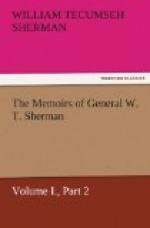Other questions absorbed the attention of military commanders; and by way of illustration I here insert a few letters from my “letter-book,” which contains hundreds on similar subjects:
Headquarters fifth division
Memphis, Tennessee, August 11, 1862
Hon. S. P. Chase, Secretary of the Treasury.
Sir: Your letter of August 2d, just received, invites my discussion of the cotton question.
I will write plainly and slowly, because I know you have no time to listen to trifles. This is no trifle; when one nation is at war with another, all the people of the one are enemies of the other: then the rules are plain and easy of understanding. Most unfortunately, the war in which we are now engaged has been complicated with the belief on the one hand that all on the other are not enemies. It would have been better if, at the outset, this mistake had not been made, and it is wrong longer to be misled by it. The Government of the United States may now safely proceed on the proper rule that all in the South are enemies of all in the North; and not only are they unfriendly, but all who can procure arms now bear them as organized regiments, or as guerrillas. There is not a garrison in Tennessee where a man can go beyond the sight of the flag-staff without being shot or captured. It so happened that these people had cotton, and, whenever they apprehended our large armies would move, they destroyed the cotton in the belief that, of course, we world seize it, and convert it to our use. They did not and could not dream that we would pay money for it. It had been condemned to destruction by their own acknowledged government, and was therefore lost to their people; and could have been, without injustice, taken by us, and sent away, either as absolute prize of war, or for future compensation. But the commercial enterprise of the Jews soon discovered that ten cents would buy a pound of cotton behind our army; that four cents would take it to Boston, where they could receive thirty cents in gold. The bait was too tempting, and it spread like fire, when here they discovered that salt, bacon, powder, fire-arms, percussion-caps, etc., etc., were worth as much as gold; and, strange to say, this traffic was not only permitted, but encouraged. Before we in the interior could




